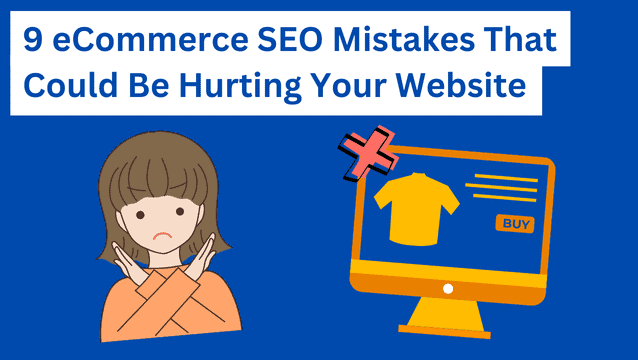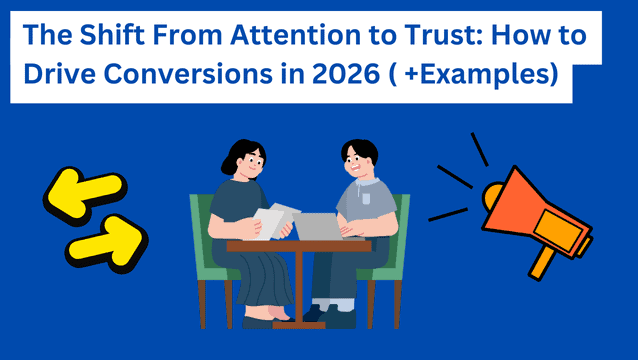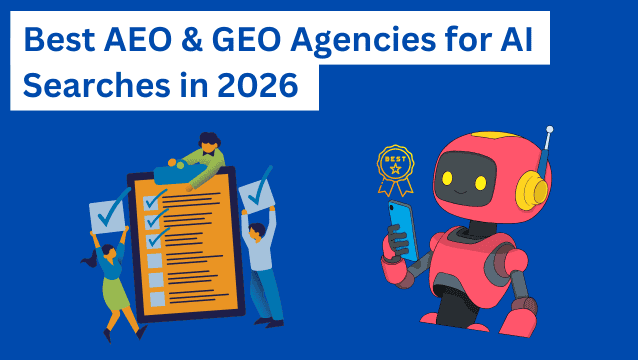Investing in industry-specific content may seem like an unnecessarily complicated digital marketing strategy. But in truth, it’s the key to boosting conversions in today’s competitive markets.
On average, brands dedicate up to 50% of their total marketing budgets to content. Yet, only a small number of organizations can say that they’re satisfied with the success of their content marketing tactics.
The reason for this isn’t that these brands are publishing subpar resources. Nor is it a lack of interest in their insights. Instead, they’re simply not managing to put out resources that genuinely resonate with their audiences.
Are you after a higher content marketing ROI? Do you want to outperform your competitors? In that case, you need to invest in niche resources.
This guide will teach you how to boost conversions with industry-specific content. It also provides actionable tips and examples for your digital marketing strategy.
Let’s get into it.
Highlights
- Industry-specific content builds trust and authority with your audience.
- Niche content ranks better in search engines and drives higher conversions.
- Personalization and relevance attract high-value leads ready to buy.
- Use expert insights, case studies, and jargon to engage the right customers.
- Industry-focused resources support lead generation, nurturing, and loyalty.
Why industry-specific, expert-produced content works
Going niche may seem like a pain in the back. And you may even feel like it doesn’t pay off, especially considering how difficult it can be to produce
In some ways, this opinion may seem justified. After all, so many brands have built their reputations by simplifying their content to attract more consumers.
But here’s the deal. Targeting a large audience is an excellent way to boost brand and product awareness. However, it only works if you’ve got a generous content marketing budget.
Are you working with tight funds? Then you might not reach enough people to turn this approach into conversions.
With this in mind, you explore industry-specific content. It can help ensure sufficient reach, engagement, and elevate conversion rates.
But what are the benefits of producing and distributing niche resources?
Consumers crave hyper-relevance

Source: attentivemobile.com
The spray and pray marketing approach is dead. Attentive’s consumer trends report found that in 2025, 90% of consumers crave personalized communications,
Consider the above statistics marketing challenges. You’ll see that industry-specific content is an excellent way to avoid frustrating your target audience.
What’s more, focusing on personalization and relevance can be an exceptional way to attract high-value leads who are ready to engage with your brand.
Consider Google’s research from 2022. It suggests that Gen Z consumers desire in-depth, niche content that aligns with their interests. So, why not give it to them?
True. Personalization, deep dives, and expert-produced resources require more time and effort to create. But they bring value to consumers. And your buyers are sure to appreciate these posts, especially if they’re unique and challenging to find elsewhere.
Expert resources rank better
Another benefit of investing in industry-specific content is that it’s a surefire way to improve your SEO.
There’s a lot of speculation about what criteria search engines use to rank search results. Yes, many remain unconfirmed. And they change more often than SEO experts would prefer. Nevertheless, Google has published some guidelines on what does work.
According to the organization, what it looks for includes expertise, experience, authority, and trust (E-E-A-T).
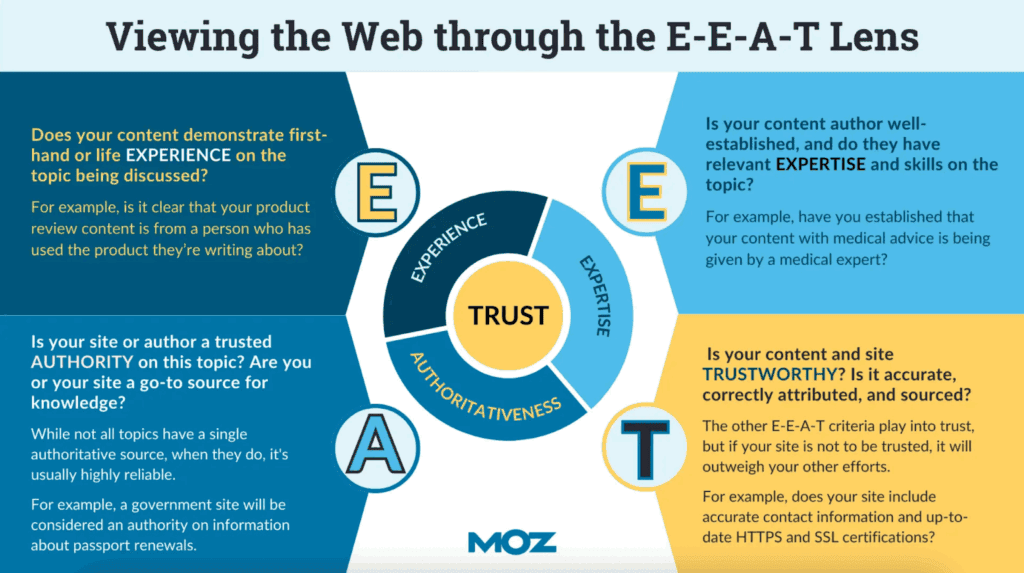
Source: moz.com
And what better way to communicate any of these brand characteristics than to invest in industry-specific content?
Ultimately, producing unique, valuable, and niche resources is an effective way to enhance SEO. More importantly, it’s the key to positioning your brand as an industry authority. And it’s a great way to earn your audience’s trust and convince them to choose your brand over your competitors.
Industry-specific content builds trust
When exploring methods to boost conversions, consider the fact that consumers want to buy from credible brands.
Research from the past few years shows an increased demand for brand authority. Edelman found that brand trust has a direct impact on buying decisions. In fact, it is as important as product price and quality.

Source: edelman.com
Additionally, who do consumers trust? They put their faith in experts and scientists. And they want brands to employ these spokespeople.
So, if you’re looking for a way to use industry-specific content in your digital marketing strategy, why not view it as a method to position your business as a trustworthy one?
After all, in-depth, niche resources provide the ideal backdrop to prove your expertise. Plus, generously sharing value with your audience demonstrates your brand’s benevolence and dedication to customer satisfaction, the same commitment that should define your customer service.
When your support reflects the clarity, expertise, and generosity shown in your content, it strengthens trust at every stage of the customer journey.
Going niche may help bypass your competitors
Finally, when looking to boost conversions, you may want to produce broad resources. After all, widening your reach opens up the opportunity to attract more leads.
However, general keywords may have higher search volumes. But what about the quality of traffic they attract?
Research consistently shows that niche (long-tail) search terms yield higher conversions than their general counterparts.
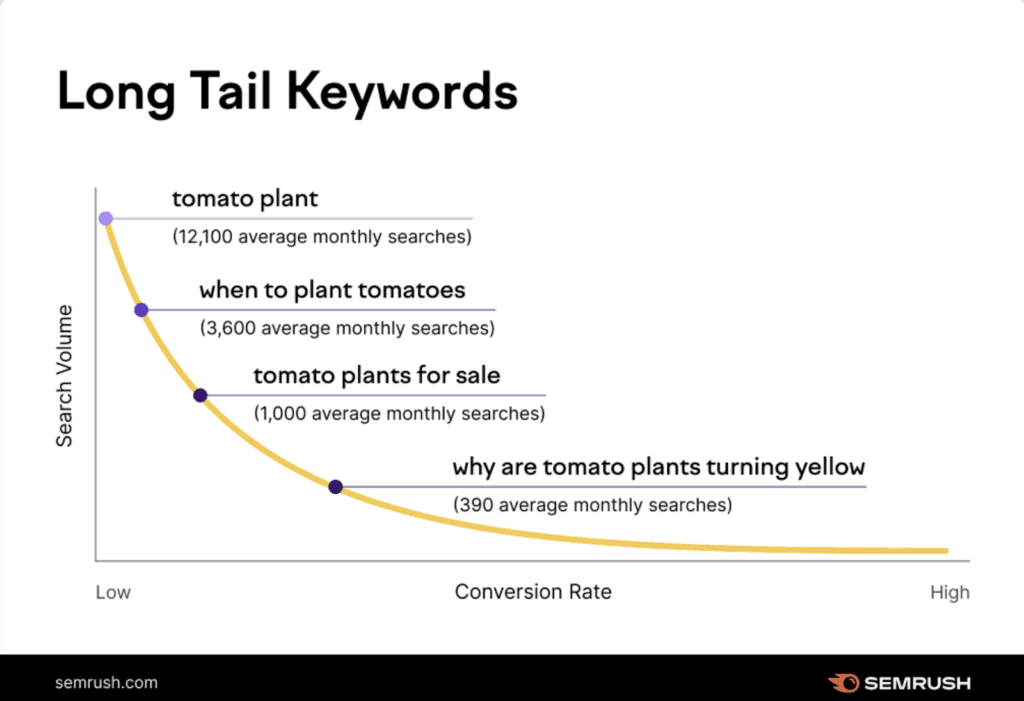
Source: semrush.com
The great thing about producing industry-specific content that targets these keywords is that your competitors may be overlooking these opportunities.
So, try to address (and own) the topics no one else in your niche is talking about. That way, you can carve out a spot for your business. And you can even do so in competitive industries and against well-established rivals.
For example, searches for how to create your own coffee brand show how familiar products capture online attention. Beverages often tend to go viral because they connect with lifestyle and community interests, proving that relevance can drive engagement more than innovation.
How to use industry-specific content to boost conversion rates
You understand the benefits of industry-specific content. And you’re well aware of how it affects conversion rates.
But how do you include this content format in your content marketing strategy?
Here are a few ideas on how to incorporate niche resources into your marketing funnel.
Create content for both novice and expert consumers
Creating visibility can be challenging, especially in highly distinctive niches. So, if you want to build a market for your brand and products, you have to know how to stand out.
Industry-specific content can be helpful in this regard. It can draw prospects into your sales funnel. And it can help them feel comfortable enough to make a buying decision.
Of course, to use this tactic to boost conversions, you must first understand the typical sales funnel.
Generally, people start their buyer’s journeys by identifying their pain points. And, for the most part, their educational journeys begin by Googling broad topics. Then, they collect info and gain insights. Finally, they begin to narrow down their searches and interact with niche content.
So, how do you turn these consumers into customers? A great method is to invest in a wide variety of industry-specific resources.
Create topic clusters that start wide. Then, narrow down. Furthermore, explore ways to introduce your niche solutions in a way that’s subtle yet relevant to your audience.
Check out how OneTouch does it.
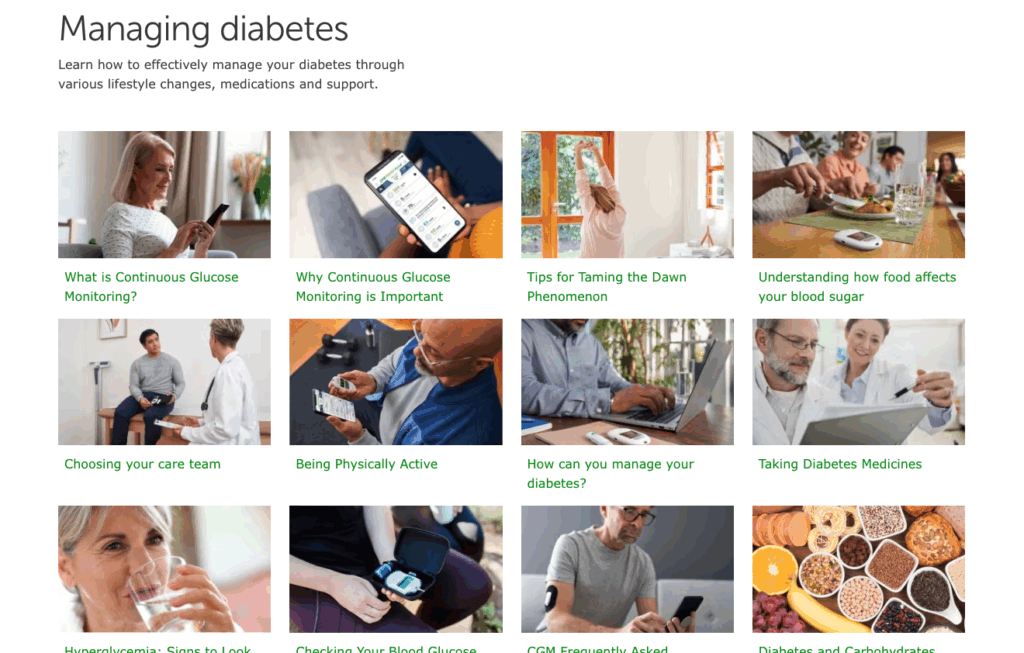
Source: onetouch.com
This brand created a clear learning journey for potential prospects. First, it helps web visitors understand diabetes and its symptoms. Then, it provides tips for management (including continual glucose monitoring). Finally, it introduces advanced strategies for living with the disease, without allowing it to limit day-to-day activities.
The tactic here is to break down complex concepts into manageable, bite-sized topics. It’s one of the best uses of industry-specific content.
For starters, it educates your audience (which automatically boosts conversion rates). But also, it prevents prospects from becoming overwhelmed by too much info at once, which actively avoids analysis paralysis and its negative impact on people’s purchase intent.
Boldly use industry jargon and technical terms
Many content marketers view the use of jargon or technical terms as a negative aspect. And, to an extent, this can be true.
Complex language and sentence structures can minimize content readability and accessibility. And they can alienate top-of-the-funnel consumers. Particularly those whose insights aren’t developed enough to handle industry-specific language.
However, you might be targeting B2B customers. In that case, jargon could be your best bet for establishing authority and communicating expertise.
When exploring tactics for using industry-specific content to boost conversions, always consider who you’re writing for. Then, adjust your vocabulary accordingly.
For instance, a brand like Vidpros shouldn’t shy away from using terms such as “fractional video editing service” on its blog. After all, its target audience likely understands what it means. Moreover, its ideal customers likely want this type of service. They might even be actively searching for it.
So, by using the right language, Vidpros is actually elevating its discoverability through content and ensuring that the right people find its offer.
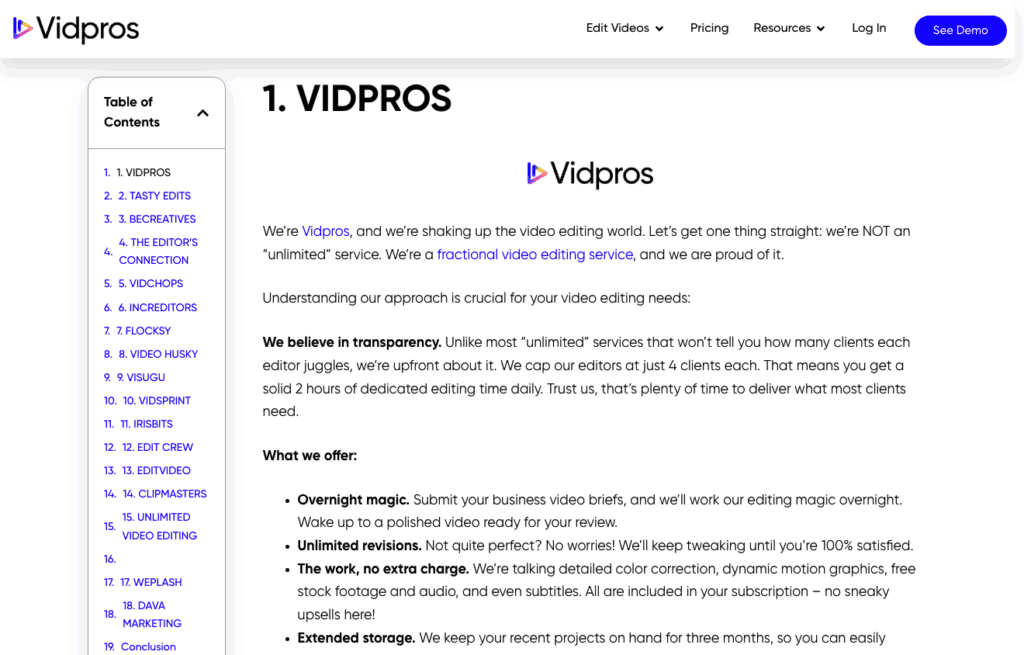
Source: vidpros.com
Zoom in on use cases to attract mid-funnel prospects
Whether they’re novices or experts, your prospects likely have a use case in mind for your solutions. So why not use industry-specific content to attract their attention?
Try crafting resources around an industry-specific use case. That way, you can personalize your target audience’s brand experience. Additionally, you can present web visitors with hyper-relevant content that will have a higher chance of resonating and encouraging them to convert.
OrthoBracing uses this content tactic splendidly. Check out the Benefits of Cold Therapy After Total Knee Arthroplasty. In the article, the brand shows that it understands its target audience’s pain points. Moreover, it demonstrates a dedication to removing those pain points via valuable educational content.
The result is not just a high-quality article with targeted reach. It also includes a more satisfying web visitor experience, which is a great precursor for conversions.
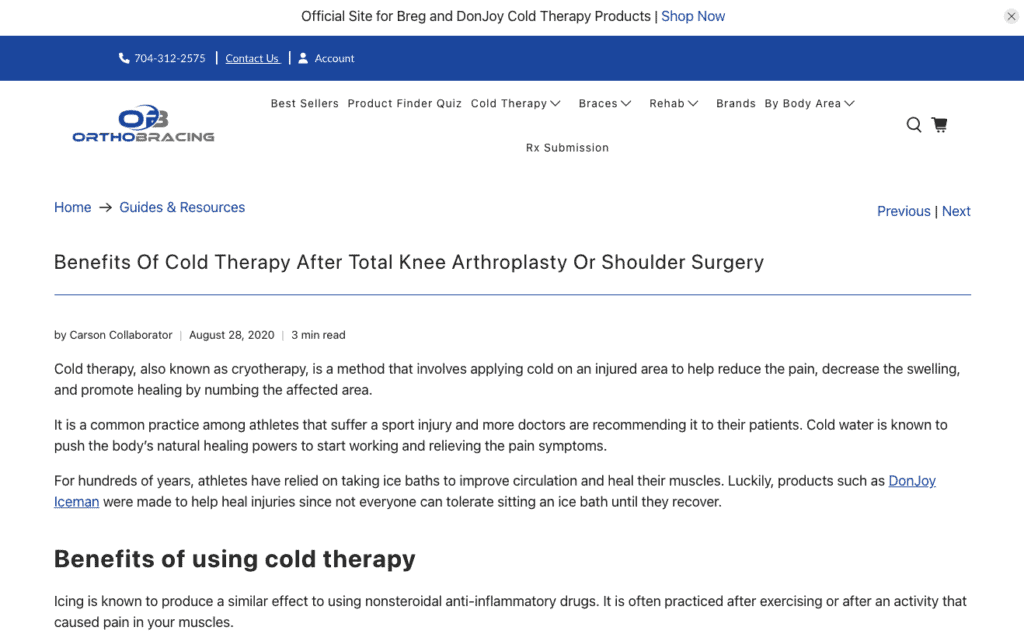
Source: orthobracing.com
Use content as a lead-generation and nurturing mechanism
People who land on your website searching for information may not yet be ready to convert. But that doesn’t mean you shouldn’t try to capture them as leads.
After all, a complete sales cycle requires several brand touches between awareness and conversion. So, explore methods to transform attractive, industry-specific content into mechanisms within your sales funnel.
Consider including lead-generation elements in your content. This is what Somewhere does in the Best Customer Service Outsourcing Companies guide. It’s a simple conversion-boosting tactic. Yet it works. Why? Because it attracts web visits through targeting a niche search term. It engages readers through value.
It generates trust by remaining objective. And it removes common conversion obstacles by pointing out that the brand has a Zero Risk policy to ensure client satisfaction.
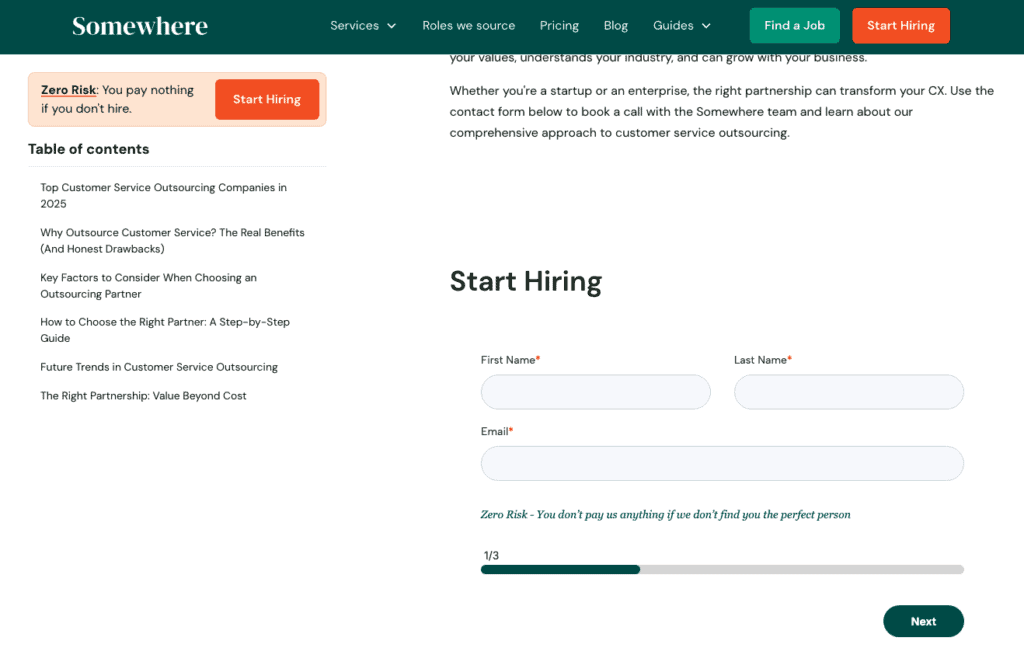
Source: somewhere.com
Alternative methods to accomplish the same effect include creating interactive tools or quizzes.
Or, you could produce traditional gated resources. These include ebooks, white papers, and original research studies. Do it right, and your prospects will want to get their hands on these. More importantly, they’ll be happy to exchange their contact information for such content.
Of course, be aware of the fact that your work doesn’t end once you’ve captured a lead. Arguably, that’s where it begins.
Once you’ve convinced a potential customer to sign up for your newsletter or follow you on social media, consider how you can get them to stick around.
Industry-specific content, particularly that tailored to expert audiences, can be an easy way to make prospects want to hear from your brand.
So, do your best to elevate your email marketing and content distribution tactics. And consider ways to transform new or existing resources into digestible content bits that will continually reengage leads and followers.
Gallup’s original research updates are a great example of effective lead nurturing via industry-specific content. They present email subscribers with valuable data and original findings. They’re a convenient way for leads to stay on top of the latest news, as they’re delivered directly to their inbox. Plus, of course, all these emails include attractive CTAs to encourage conversions.
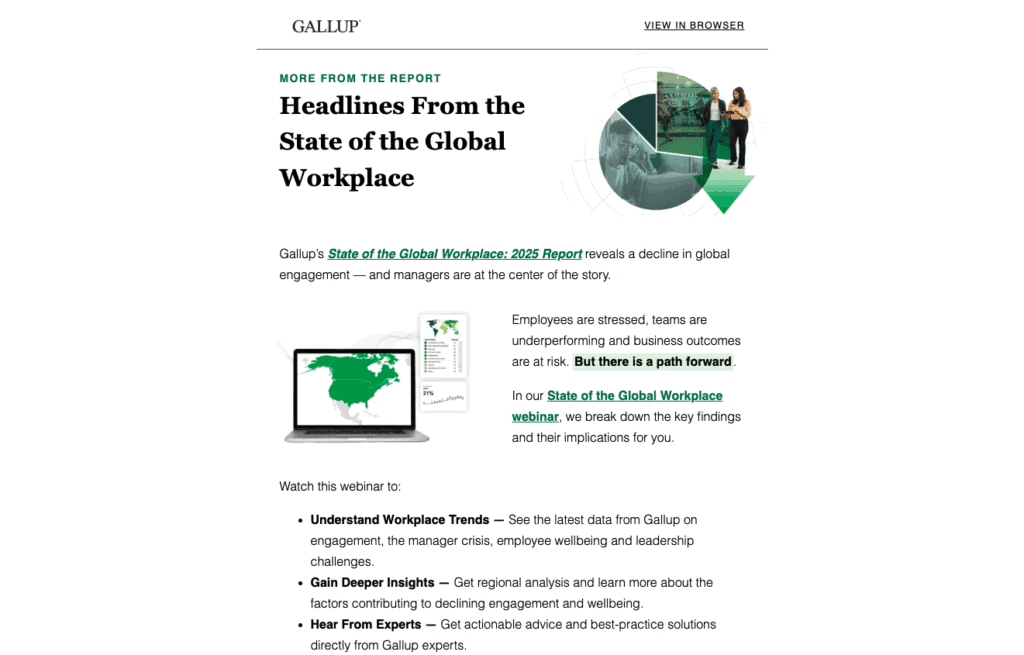
Screenshot provided by author
Use industry-standard formats
Do you operate in a unique niche or target a distinct audience? Chances are, they have some pretty specific expectations about your brand’s communication methods.
So, when investing in niche content, one of the easiest ways to delight these prospects is to use content types your prospects want to see from your brand.
Study the content formats that work best for your niche and industry. Then, try to optimize your resources to align with your audience’s content consumption habits.
A good example to look at is Brain Ritual, a natural migraine supplement brand. This company’s target audience consists of science-conscious individuals looking to solve a medical pain point. So, the brand employs a formal, science-oriented content format to communicate that it has exactly what its target audience seeks.
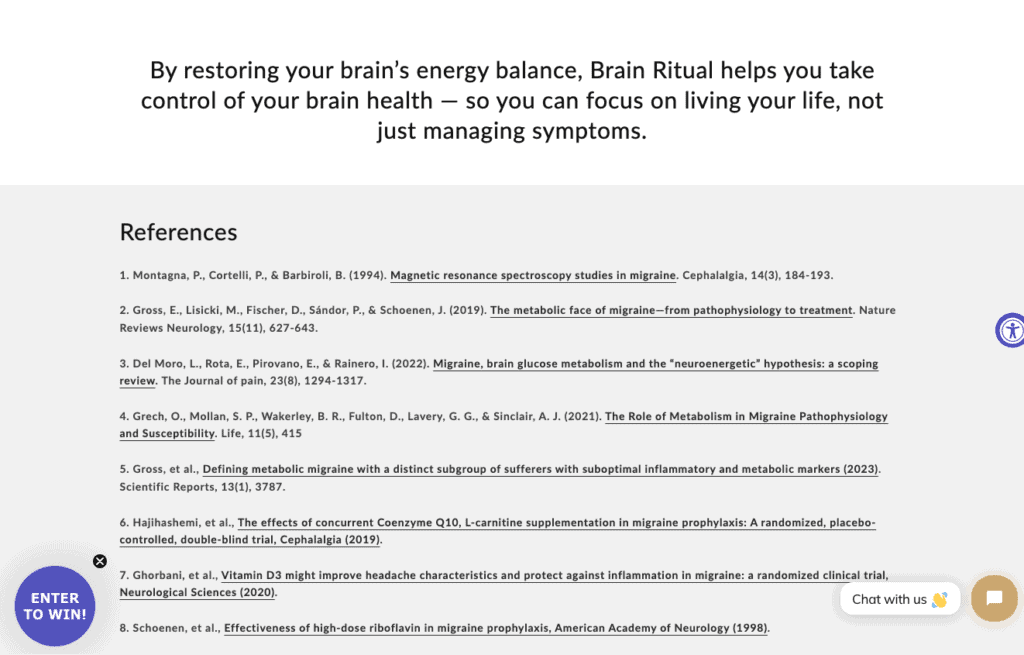
Source: brainritual.com
Use industry-specific content as social proof
Finally, to boost conversions, you must showcase high-quality social proof throughout your online presence. But how do you do it in a way that works in your niche and industry?
Well, it might be a good idea to rely on trust-building content formats that are distinctive for your area of expertise. Think case studies, video testimonials, or data-backed reports.
Or, you could do something entirely original to your brand.
Check out Rosie and their Landscaping Answering Service page as a great example of this in action. Instead of generic messaging the company uses industry-specific content as social proof. The recordings of its solution are all exceptional testimonials to the effectiveness of the brand’s product. Moreover, they’re far more engaging than run-of-the-mill testimonials.
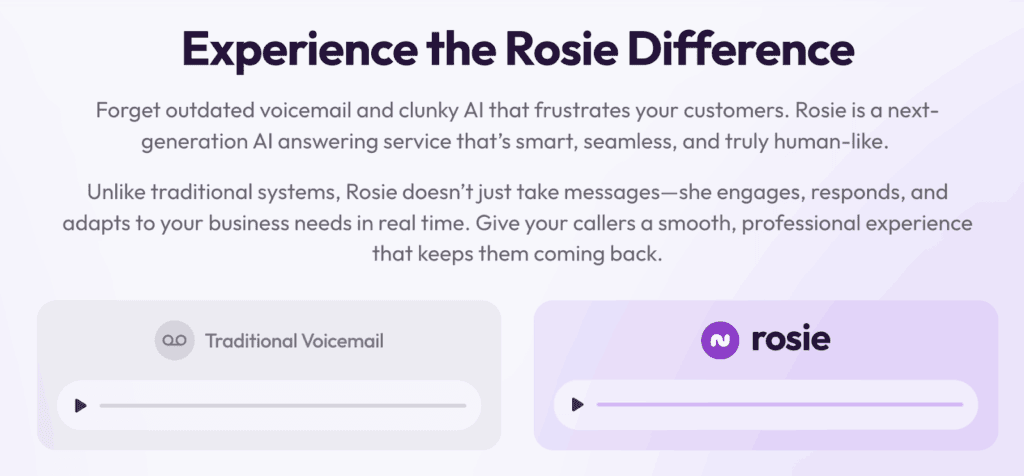
Source: heyrosie.com
Final thoughts
Developing a unique content marketing strategy isn’t always easy. After all, content demand is huge these days. Maintaining a solid publishing schedule can take its toll.
Nevertheless, don’t allow your digital marketing tactics to become standardized. Instead, always explore methods to incorporate original, industry-specific content in your sales funnel.
That way, you will stand out from your competitors and attract higher-quality leads. You’ll position your business as an industry authority. And you’ll earn the trust of your target audience.
At the end of the day, all of these factors will elevate your conversion rates. Plus, if you deliver a great CX, they will also contribute to customer loyalty, which is key for long-term business success. Ready to boost conversions with industry-specific content? Our experts at uSERP can help. Book a call with us today.
